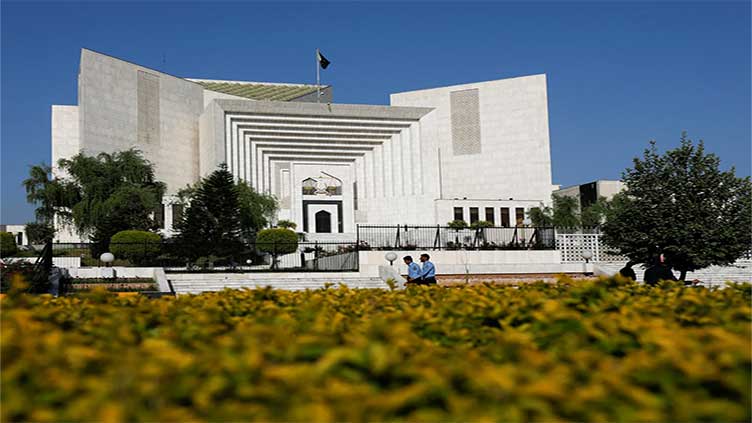Supreme Court reserves verdict on SIC plea for reserved seats

Pakistan
A 13-member full court, led by Chief Justice Qazi Faez Isa, heard the case
The bench has to decide whether reserved seats will be given to the SIC, or to the other parties
ISLAMABAD (Dunya News) – The Supreme Court on Tuesday reserved verdict on a petition filed by the Sunni Ittehad Council (SIC) against the denial of allocation of reserved seats.
Chief Justice Qazi Faez Isa addressed the attendees after lawyers arguments that he would not say with certainty when the decision would be announced. "We [the bench members] would consult with each other on the time to announce the decision."
Meanwhile, the court staff told media that the decision would not be pronounced today.
A 13-member full court, led by Chief Justice of Pakistan Qazi Faez Isa, heard the plea. Other judges on the bench were Justice Syed Mansoor Ali Shah, Justice Muneeb Akhtar, Justice Yahya Afridi, Justice Aminuddin Khan, Justice Jamal Khan Mandokhail, Justice Muhammad Ali Mazhar, Justice Ayesha A. Malik, Justice Athar Minallah, Justice Syed Hassan Azhar Rizvi, Justice Shahid Waheed, Justice Irfan Saadat Khan and Justice Naeem Akhtar Afghan.
TODAY'S PROCEEDINGS
SIC counsel Faisal Siddiqui submitted before the Supreme Court that he would prove that the Election Commission (ECP) had not fulfilled its responsibility.
He stated this as soon as the court resumed hearing on the SIC’s plea regarding reserved seats for women and minorities. "I will take 15 minutes to argue my point," he added.
Advocate Siddiqui stated that they [ECP] argued that the SIC did not participate in the elections and did not submit the list of candidates for reserved seats.
He argued that the Balochistan Awami Party (BAP) did not win any seat in 2018 but got three reserved seats. The ECP submitted a prejudiced response regarding the BAP election.
The issue was raised before the ECP before moving the Supreme Court, he submitted and added that the ECP claim was contrary to its own documents. Isn’t it distortion [of facts]?
Justice Mandokhail asked the lawyer was the ECP decision in accordance with the Constitution? He replied that [in 2018] it was in accordance with the law.
Justice Minallah inquired him whether the ECP decision on the BAP reserved seats was challenged.
Advocate Siddiqui said the ECP would have admitted that there was a mistake. But it acted as if the decision regarding the BAP did not exist.
Justice Saadat questioned him whether the BAP participated in the Khyber Pakhtunkhwa elections? Advocate Siddiqui replied that it contested the election but did not win a seat.
Justice Saadat said this case is different from that of the BAP. The SIC did not participate in the elections. He asked the lawyer to argue now and give a detailed answer later.
Justice Mandokhail said that there is a difference between a political party and a parliamentary party. The decisions taken in parliament are made by the parliamentary party. Such decisions cannot be made by a political party.
A parliamentary party is not bound to accept the decision of a political party.
For example, the parliamentary party will decide whether to vote the prime minister or not. It (the parliamentary party) is not bound to implement the decision of the political party.
Advocate Siddiqui agreed with Justice Mandokhail.
Everyone in the court burst into laughter when Justice Mandokhail called the name BAP (father) weird.
Justice Mandokhail questioned what will happen if a party wins a seat in [three] provinces and does not win in one.
Advocate Siddiqui replied that BAP won seats in other provinces but did not win a seat in Khyber Pakhtunkhwa.
The chief justice asked Advocate Siddiqui whether he wanted the Supreme Court to take judicial notice. If you want the Supreme Court to take up the 2018 election [anomaly], it can do so. But the court would not take into consideration the 2018 election [while deciding SIC plea].
Advocate Siddiqui submitted that the apex court should take into consideration the discriminatory attitude of the ECP.
Chief Justice Isa inquired him whether the ECP was right in 2018? Is the Supreme Court bound by the interpretation of the ECP?
“I don't want to embarrass you; were the 2018 elections right?” he asked the lawyer.
It may be noted that the bench has to decide whether reserved seats will be given to the SIC, or to other parties, or the issue will be sent to parliament to decide.
It was the eighth hearing on the SIC plea. The ECP is of the opinion that the SIC is not entitled to reserved seats, while the PML-N, the PPP and the JUI-F have also opposed the SIC petition for reserved seats for women and minorities.
Also read: Isn't it responsibility of judiciary to correct ECP's unconstitutional step, asks Justice Minallah
Justice Athar Minallah in last hearing remarked that isn’t it responsibility of the judiciary to correct mistakes committed by the Election Commission of Pakistan (ECP) who denied the right to a political party by keeping it away "unconstitutionally".


